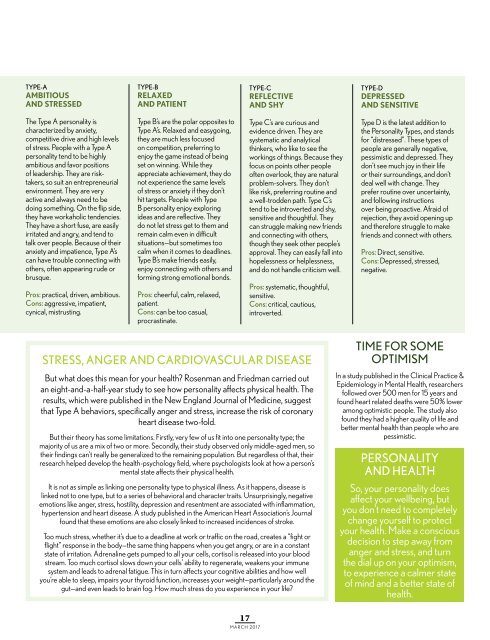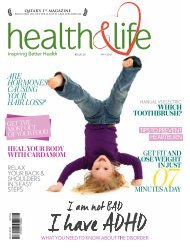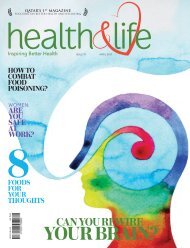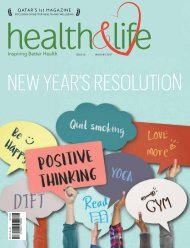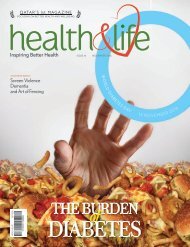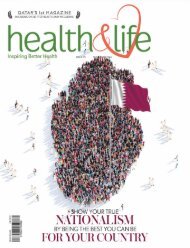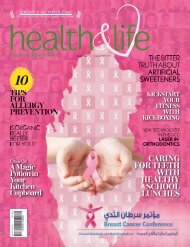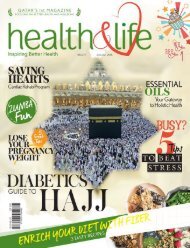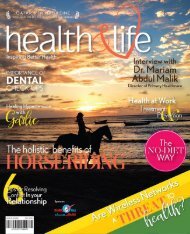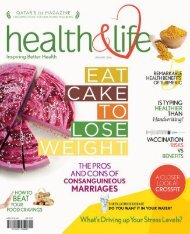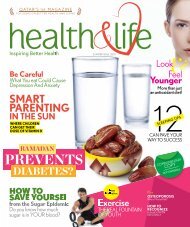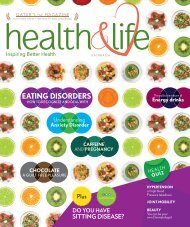Health & Life Magazine March 2017
Health & Life Magazine March 2017 www.health-n-life.com
Health & Life Magazine March 2017
www.health-n-life.com
You also want an ePaper? Increase the reach of your titles
YUMPU automatically turns print PDFs into web optimized ePapers that Google loves.
TYPE-A<br />
AMBITIOUS<br />
AND STRESSED<br />
TYPE-B<br />
RELAXED<br />
AND PATIENT<br />
TYPE-C<br />
REFLECTIVE<br />
AND SHY<br />
TYPE-D<br />
DEPRESSED<br />
AND SENSITIVE<br />
The Type A personality is<br />
characterized by anxiety,<br />
competitive drive and high levels<br />
of stress. People with a Type A<br />
personality tend to be highly<br />
ambitious and favor positions<br />
of leadership. They are risktakers,<br />
so suit an entrepreneurial<br />
environment. They are very<br />
active and always need to be<br />
doing something. On the flip side,<br />
they have workaholic tendencies.<br />
They have a short fuse, are easily<br />
irritated and angry, and tend to<br />
talk over people. Because of their<br />
anxiety and impatience, Type A’s<br />
can have trouble connecting with<br />
others, often appearing rude or<br />
brusque.<br />
Pros: practical, driven, ambitious.<br />
Cons: aggressive, impatient,<br />
cynical, mistrusting.<br />
Type B’s are the polar opposites to<br />
Type A’s. Relaxed and easygoing,<br />
they are much less focused<br />
on competition, preferring to<br />
enjoy the game instead of being<br />
set on winning. While they<br />
appreciate achievement, they do<br />
not experience the same levels<br />
of stress or anxiety if they don’t<br />
hit targets. People with Type<br />
B personality enjoy exploring<br />
ideas and are reflective. They<br />
do not let stress get to them and<br />
remain calm even in difficult<br />
situations—but sometimes too<br />
calm when it comes to deadlines.<br />
Type B’s make friends easily,<br />
enjoy connecting with others and<br />
forming strong emotional bonds.<br />
Pros: cheerful, calm, relaxed,<br />
patient.<br />
Cons: can be too casual,<br />
procrastinate.<br />
Type C’s are curious and<br />
evidence driven. They are<br />
systematic and analytical<br />
thinkers, who like to see the<br />
workings of things. Because they<br />
focus on points other people<br />
often overlook, they are natural<br />
problem-solvers. They don’t<br />
like risk, preferring routine and<br />
a well-trodden path. Type C’s<br />
tend to be introverted and shy,<br />
sensitive and thoughtful. They<br />
can struggle making new friends<br />
and connecting with others,<br />
though they seek other people’s<br />
approval. They can easily fall into<br />
hopelessness or helplessness,<br />
and do not handle criticism well.<br />
Pros: systematic, thoughtful,<br />
sensitive.<br />
Cons: critical, cautious,<br />
introverted.<br />
Type D is the latest addition to<br />
the Personality Types, and stands<br />
for “distressed”. These types of<br />
people are generally negative,<br />
pessimistic and depressed. They<br />
don’t see much joy in their life<br />
or their surroundings, and don’t<br />
deal well with change. They<br />
prefer routine over uncertainty,<br />
and following instructions<br />
over being proactive. Afraid of<br />
rejection, they avoid opening up<br />
and therefore struggle to make<br />
friends and connect with others.<br />
Pros: Direct, sensitive.<br />
Cons: Depressed, stressed,<br />
negative.<br />
STRESS, ANGER AND CARDIOVASCULAR DISEASE<br />
But what does this mean for your health? Rosenman and Friedman carried out<br />
an eight-and-a-half-year study to see how personality affects physical health. The<br />
results, which were published in the New England Journal of Medicine, suggest<br />
that Type A behaviors, specifically anger and stress, increase the risk of coronary<br />
heart disease two-fold.<br />
But their theory has some limitations. Firstly, very few of us fit into one personality type; the<br />
majority of us are a mix of two or more. Secondly, their study observed only middle-aged men, so<br />
their findings can’t really be generalized to the remaining population. But regardless of that, their<br />
research helped develop the health-psychology field, where psychologists look at how a person’s<br />
mental state affects their physical health.<br />
It is not as simple as linking one personality type to physical illness. As it happens, disease is<br />
linked not to one type, but to a series of behavioral and character traits. Unsurprisingly, negative<br />
emotions like anger, stress, hostility, depression and resentment are associated with inflammation,<br />
hypertension and heart disease. A study published in the American Heart Association’s Journal<br />
found that these emotions are also closely linked to increased incidences of stroke.<br />
Too much stress, whether it’s due to a deadline at work or traffic on the road, creates a “fight or<br />
flight” response in the body—the same thing happens when you get angry, or are in a constant<br />
state of irritation. Adrenaline gets pumped to all your cells, cortisol is released into your blood<br />
stream. Too much cortisol slows down your cells’ ability to regenerate, weakens your immune<br />
system and leads to adrenal fatigue. This in turn affects your cognitive abilities and how well<br />
you’re able to sleep, impairs your thyroid function, increases your weight—particularly around the<br />
gut—and even leads to brain fog. How much stress do you experience in your life?<br />
TIME FOR SOME<br />
OPTIMISM<br />
In a study published in the Clinical Practice &<br />
Epidemiology in Mental <strong>Health</strong>, researchers<br />
followed over 500 men for 15 years and<br />
found heart related deaths were 50% lower<br />
among optimistic people. The study also<br />
found they had a higher quality of life and<br />
better mental health than people who are<br />
pessimistic.<br />
PERSONALITY<br />
AND HEALTH<br />
So, your personality does<br />
affect your wellbeing, but<br />
you don’t need to completely<br />
change yourself to protect<br />
your health. Make a conscious<br />
decision to step away from<br />
anger and stress, and turn<br />
the dial up on your optimism,<br />
to experience a calmer state<br />
of mind and a better state of<br />
health.<br />
17<br />
MARCH <strong>2017</strong>


